by Lisa Cooke | Nov 15, 2017 | 01 What's New, Personal History, Story |
To be the family historian in a clan is an honored role. But to fulfill it effectively, you must include all stories–including your own. So here’s a prompt and a story to get you started: What led you to become a genealogist?
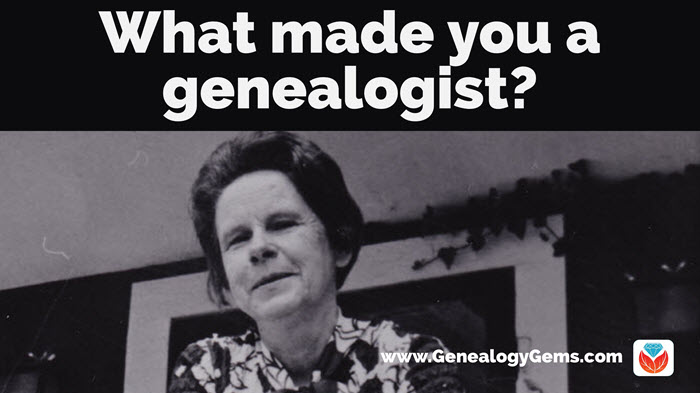
“Your stories are the family history of your descendants,” is something you’ve heard me say on the Genealogy Gems Podcast. In her first article here at Genealogy Gems, I’ve asked genealogist Margaret Linford to share one of her own stories with you: how she came to be a genealogist. I’m anxious for you to get to know Margaret because she has some wonderful gems in store for you in the months ahead. Grab your favorite cup of tea and enjoy!” -Lisa Louise Cooke
What Made Me a Genealogist?
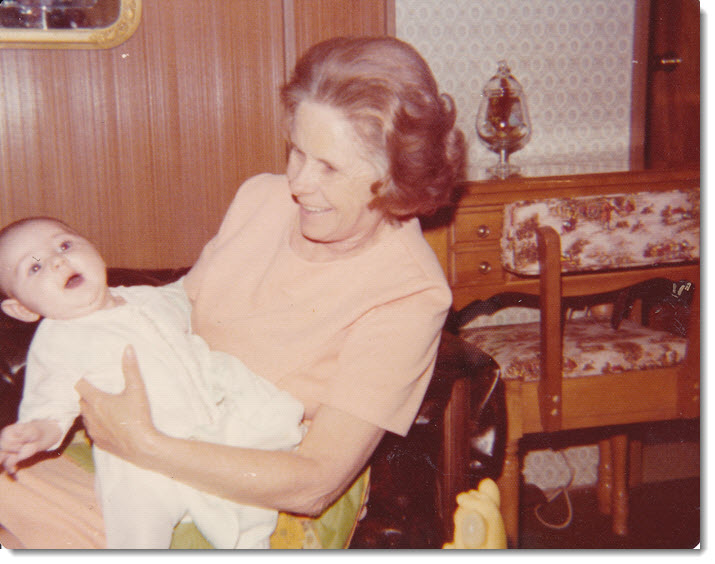
Grandma Overbay in 1974 with baby Margaret. Photos courtesy of Margaret Linford.
I can remember, as a little girl, walking in after school. The aroma of freshly baked biscuits or bread always filled the air and enveloped anyone who walked through the door. The house was spotless. The bed linens were crisp.
This was the home of my Grandma Overbay. She was completely devoted to her family. Her home was a refuge for many when they found themselves struggling through life. No one was turned away and she made sure that those who entered her house always felt welcome.
My answer to the question, “What made me a genealogist?” can be traced back to this one woman and my countless experiences with her.
The Greatest Gift
I can remember many lazy summer evenings on the porch, listening to stories of her childhood, accompanied by the rhythmic sound of crickets. Through Grandma’s stories, I was transported back in time. In my mind’s eye, I could see her as a little girl picking blackberries on a mountaintop and following the local doctor from house to house as he treated patients. She lived in a small community, where it was a common practice, in that time, for doctors to make house calls. She had an insatiable curiosity, which prompted these tag-along visits. I imagine it was on these “house calls” that she came to love hearing stories. I loved being able to envision her as a carefree young girl, being taught life lessons, as she served as an unofficial intern to this kind community doctor.
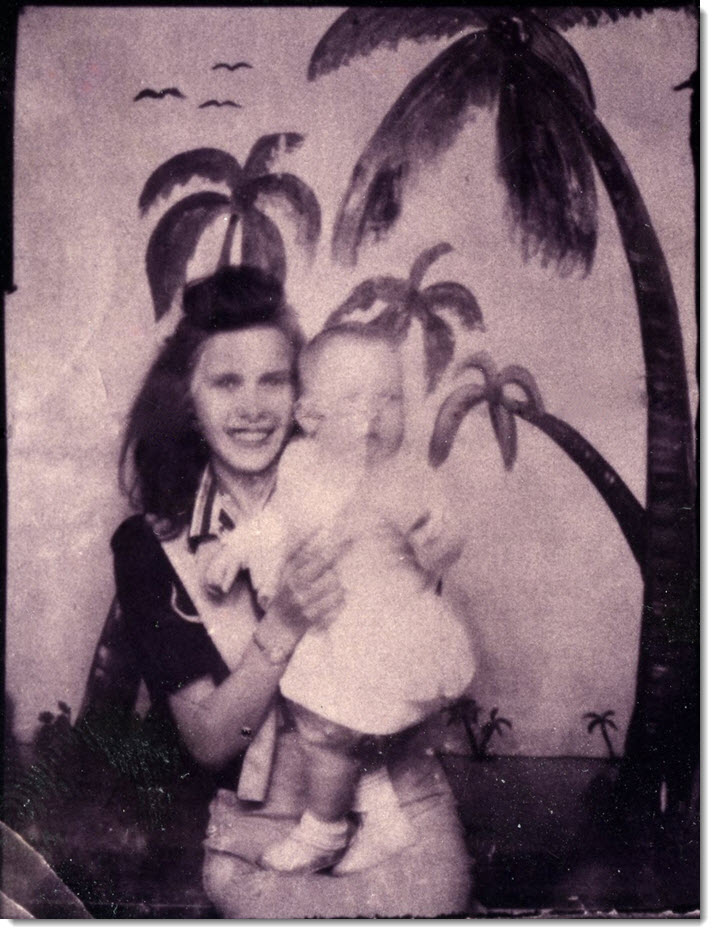
A younger version of Grandma Overbay
She painted pictures on the canvas of my mind and introduced me to my ancestors. With each story she told, she was “downloading” some of her memories into the brains of her children and grandchildren. This was one of the greatest gifts anyone has ever given me: the gift of her time and her stories.
“With each story she told, she was ‘downloading’ some of her memories into the brains of her children and grandchildren. This was one of the greatest gifts anyone has ever given me: the gift of her time and her stories.”
I don’t think my grandma realized how important her stories would be to creating a strong family narrative. But her legacy lives on, thanks to the time she invested in a budding family genealogist.
The Master Storyteller
I feel fortunate to have been the granddaughter of this master storyteller. She created characters and made my ancestors come to life. They had traveled the path of life that I was just beginning, and had much wisdom to pass down to me. My grandma was deliberate in her attempts to transmit this wisdom.
Life lessons were always embedded within the stories. She often told a story that was related to her by her father. He had elected to disregard some of his mother’s wise counsel with regard to a person he wanted to date. He later learned that his mother truly knew what was best and he could have been spared an agonizing experience if he had chosen to heed her counsel. This theme of “honoring father and mother” was woven into many of her stories.
I learned from her that everyone has something to teach us–if we choose to take time and listen to the people we encounter on a day-to-day basis. Grandma believed in devoting her full attention to people. She would stop everything she was doing to lend an ear to someone who needed to talk. In these moments, she was offering her friendship and genuine concern. She was a listener, always sifting through the seemingly mundane to discover bits of wisdom and life lessons she otherwise may not have learned. She taught me, in word and by example, that life can be enriched as we take time to hear each other’s stories.
Pearls of Wisdom
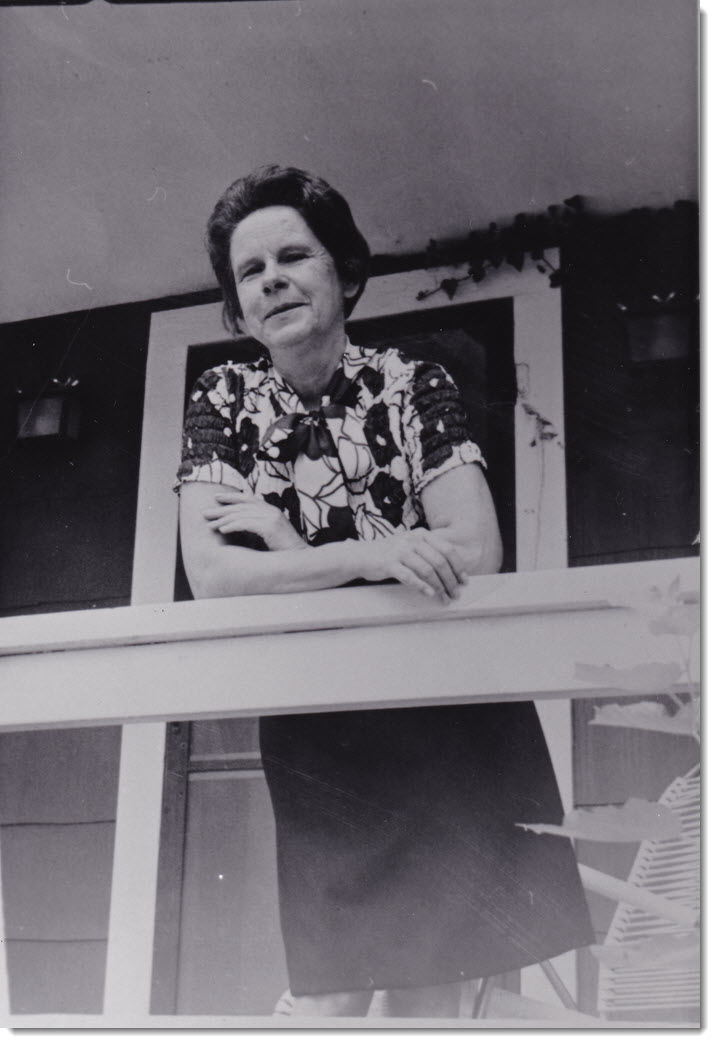
Margaret Poston Overbay in the early 1970s
Through the successes and disappointments of my ancestors, they left their children and grandchildren pearls of wisdom. These pearls are strung together, as we remember stories of the past. The greatest “heirloom” I ever inherited was this “string of pearls,” given to me one story at a time.
Six years ago, when I was asked to begin writing a bi-weekly column for my hometown newspaper, this heirloom is what prompted me to christen it “String of Pearls.” There is an even deeper meaning tucked into the name for me. I share the name “Margaret” with my grandmother and great-grandmother. I grew up often resenting being given such an “old” name. As I have matured, I have come to love it. To my delight, I have found that the name, which means “pearl,” has been used for many generations in my family. I am but one in a long string of “pearls.”
There are people like my grandma within each family. They are the keepers of the family stories. They seem to have a special calling to pass along the wisdom and knowledge of previous generations. There is an old proverb that says, “You live as long as you are remembered.” We are remembered as long as our stories are told, and it starts with you telling your story.
Questions Worth Asking
What is it that ignites the spark within someone’s heart to possess a love of family history, to take their rightful place as the “keeper” of the stories? What motivates certain individuals to be so dedicated to searching out their ancestors? What made my Grandma so intent on transmitting these family stories to future generations? I never had the opportunity to ask her that question. I had no way of knowing that her presence would be snatched away so soon. I often find myself repeating the phrase, “if I had only asked.” Perhaps you have, upon occasion, had the same thought with regard to your own family members.
Though we may have some regrets about unanswered questions, it’s never too late for us, as family historians, to start answering these questions ourselves. What inspired you to delve into your family’s history? Was it a grandparent, a photograph, or a family mystery that you wanted to solve? What prompted you to first seek out your ancestors?
As I answered these questions for myself, I was reminded of the emotional connection to my Grandma. A flood of memories came back to me, serving to remind me that these family ties last long after death. Our ancestors live on through us and through the stories they left behind. The image of my Grandma sharing her stories on the front porch will be the image that comes to mind the next time someone asks me what made me a genealogist.
Genealogy Origins
In recalling my own “genealogy origins,” I made a startling discovery. I realized that my children are well acquainted with stories of their grandparents and great-grandparents, but know little about the early life experiences of their own mother and father. I have become so focused on telling them stories from previous generations, that I have entirely neglected to tell them my own! After all, it as important to capture our own memories and experiences as it is to save our ancestors from being forgotten. Now I have a renewed commitment to preserve these stories and emotional connections for my own children and future grandchildren.
More to Come
I look forward to sharing more of my stories here with you at Genealogy Gems, as well as some good old tried and true research strategies to help you on your genealogical journey. In this first post, thank you for letting me share my genealogy origins story with you. I invite you to take some time to reflect on your own genealogy origins and go back in your mind to a place and time when you first felt the desire to search out your own ancestors. Who was it or what was it that ignited this spark within you? “What made you a genealogist?”
Share Your Story
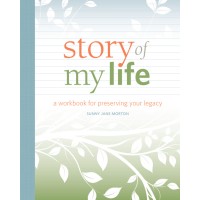 Leave a comment below to share your own “genealogy origins” story. Or, if you’re ready to capture more of your life stories, consider purchasing the life-story writing guide, Story of My Life: A Workbook for Preserving Your Legacy by Genealogy Gems Contributing Editor Sunny Morton. It’s packed with journaling prompts for every phase of life–from childhood to retirement–and opportunities to reflect on the relationships and experiences that have shaped you. Give future generations the gift of your life’s stories and lessons: the pearls you have to pass on.
Leave a comment below to share your own “genealogy origins” story. Or, if you’re ready to capture more of your life stories, consider purchasing the life-story writing guide, Story of My Life: A Workbook for Preserving Your Legacy by Genealogy Gems Contributing Editor Sunny Morton. It’s packed with journaling prompts for every phase of life–from childhood to retirement–and opportunities to reflect on the relationships and experiences that have shaped you. Give future generations the gift of your life’s stories and lessons: the pearls you have to pass on.
by Lisa Cooke | Sep 11, 2017 | 01 What's New, Memory Lane, Personal History, Writing Family History
Sixteen years ago, nearly 3,000 people died in events so horrific that the date itself has been seared into world memory: “9-11.” Today, we remember those who suffered on September 11, 2001. And we explain why many can recall that day with startling clarity: it’s a “flashbulb memory,” the kind that produces lasting, vivid impressions in our minds.
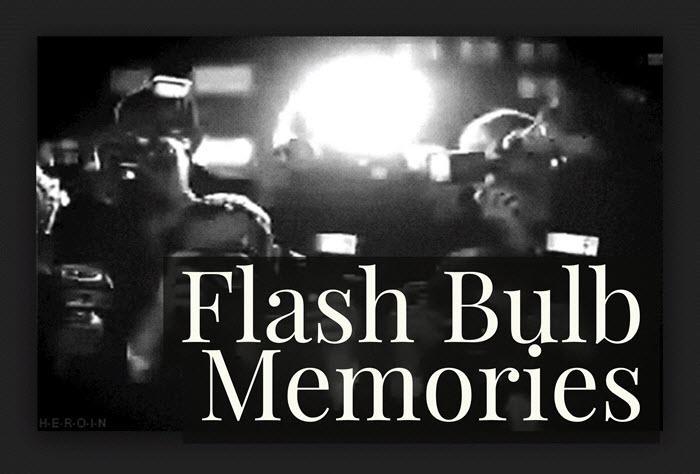
Remembering 9-11
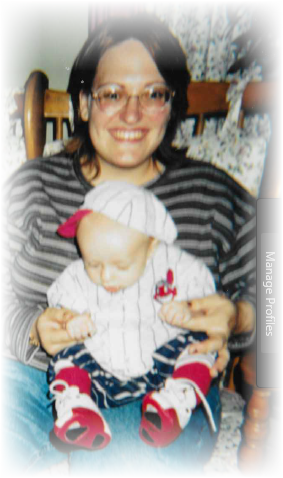
Me with my new little baby Jeremy, a month after the September 2001 attacks.
Sixteen years ago today, I was sitting at my desk in a research office at Case Western Reserve University in Cleveland, Ohio when a co-worker informed me that airplane had flown into one of the World Trade Center towers in New York City. Within minutes, someone had set up a television in our common area. So several of us were watching the news when another plane hit the second tower–and we realized this wasn’t a horrible mistake. It was an attack.
I responded instinctively, calling my husband at work and then my babysitter to check on my two-month old infant, Jeremy. As the general panic and confusion rose, I couldn’t think of anything but my baby. Before long, I left the office, swooped up my son from the babysitter’s house and fled the city. I drove toward my home in the suburbs, glancing up at the Cleveland skyline constantly, not knowing whether our city would also come under attack.
Gradually I learned, along with the rest of the world, about the full scope of the attack, the losses of thousands of lives and the heroism of those who helped others in harm’s way. I felt a little foolish for having seized little Jeremy and run when there was no actual danger to us. But that protective urge I felt was so powerful that I still remember it clearly, 16 years later, as my personal response to a day the world changed forever.
Why We Recall 9-11 So Vividly
Several years later, while researching the nature of our memories for the first edition of Story of My Life: A Workbook for Preserving Your Legacy, I learned about “flashbulb memories:”
“Flashbulb Memories are memories for the circumstances in which one first learned of a very surprising and consequential (or emotionally arousing) event. Hearing the news that President John Kennedy had been shot is the prototype case. Almost everyone can remember, with an almost perceptual clarity, where he was when he heard, what he was doing at the time, who told him, what was the immediate aftermath, how he felt about it, and also one or more totally idiosyncratic and often trivial concomitants.” -Roger Brown and James Kulk in Cognition (Vol 5, Issue 1, 1977, pages 73-99; quoted from this abstract online)
In other words, surprising and life-altering events can leave vivid and lasting impressions in our minds, like the bright flash of an old-fashioned camera flashbulb that captures a moment forever. Kennedy’s assassination and 9-11 are just two examples. What others come to mind for your own lifetime? For example, I recall with startling clarity the moment a teacher burst into my middle school classroom in 1986 to tell us that that Challenger shuttle had exploded in mid-air with school teacher Christa McAuliffe aboard. I recall other moments of personal significance with that kind of clarity, too. It doesn’t have to be a world-altering event to produce a flashbulb memory–just one that affects your world.
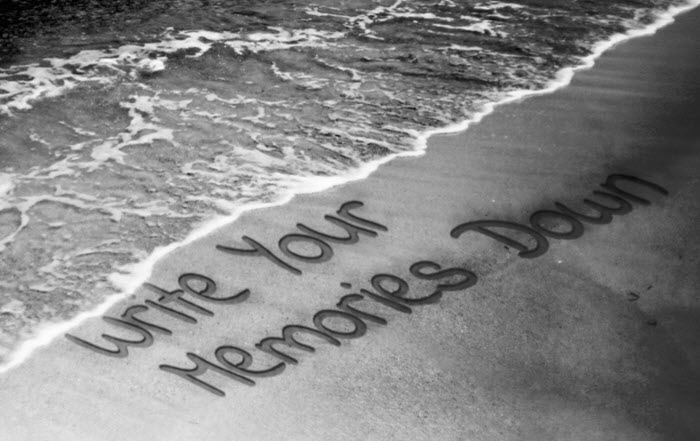
Write Your Memories Before They Fade
Recently, I read that our flashbulb memories don’t remain as bright or crisp as the moment they were captured. Psychology Today reported a 10-year study of people’s memories of 9-11.
“All survey participants still had memories of how they found out about the event, who they were with, what they were doing, how they felt, the first person they talked to and what they were doing before finding out about the attack. That means that all of the survey participants had memories that would quality as a flashbulb memory. They were generally highly confident in the memory as well.
Despite their memory confidence, when the details of their memories were compared to the initial survey taken within 10 days of 9/11, there were significant inconsistencies. A year after the event, only about 2/3 of what people remembered was accurate.” – Art Markman, PhD (click here for full article)
Now, remembering even two-thirds of an event after a year has passed is quite good. And that accuracy remained strong for 10 years. The same report states, “By 10 years after 9/11, people were still about 60% accurate. Thus, although flashbulb memories are not like videos of the event, they are probably more accurate than memories for most events that took place 10 years before.”
What are your flashbulb memories? Write them down. Try to be as accurate as possible: return in your mind not to the last time you told that memory, but to the actual experience of it. Walk yourself through it slowly. Why? The Psychology Today article includes this warning: “If someone added an incorrect detail into their memory for the event, that misinformation was likely to be repeated in later accounts rather than corrected. This suggests that one reason why flashbulb memories remain so vivid for people is that they are recalled over time. Extra information that emerges when someone recalls a memory can get incorporated into that memory later.”
This is also an excellent reason to write down your memories as soon as possible after all important events in your life. Your recollections of even your most precious and positive events will fade. So if you want to keep hold of more than 60% of that once-in-a-lifetime trip you just took, write it down as soon as possible. Even if time has already passed, go ahead and write them down. Then use memory-jogging exercises to flesh them out, and do a little research to confirm hazy details. In my book, Story of My Life, I include these strategies along with hundreds of writing prompts to get your memories flowing. Note: Recalling particularly traumatic events may most safely and productively be done with the guidance of a professional counselor.
If you haven’t already done so, why not take some time today to write your own memories of a “flashbulb event” or another important memory in your life? You may learn something from doing so, as I did about the strength of my own maternal instincts on 9-11. Or you may simply find the walk down memory lane to be meaningful, full as it is with loved ones, lessons and life experiences.
by Lisa Cooke | Aug 8, 2016 | 01 What's New, Oral History, Writing Family History |
Writing your personal history can be simple and oh-so-fun with the step-by-step approach from our own Sunny Morton. She has just released her book “Story of My Life” and we are ecstatic to tell you about it! This fill-in-the-blank workbook will guide you as you write and organize the story of your life from birth to retirement.
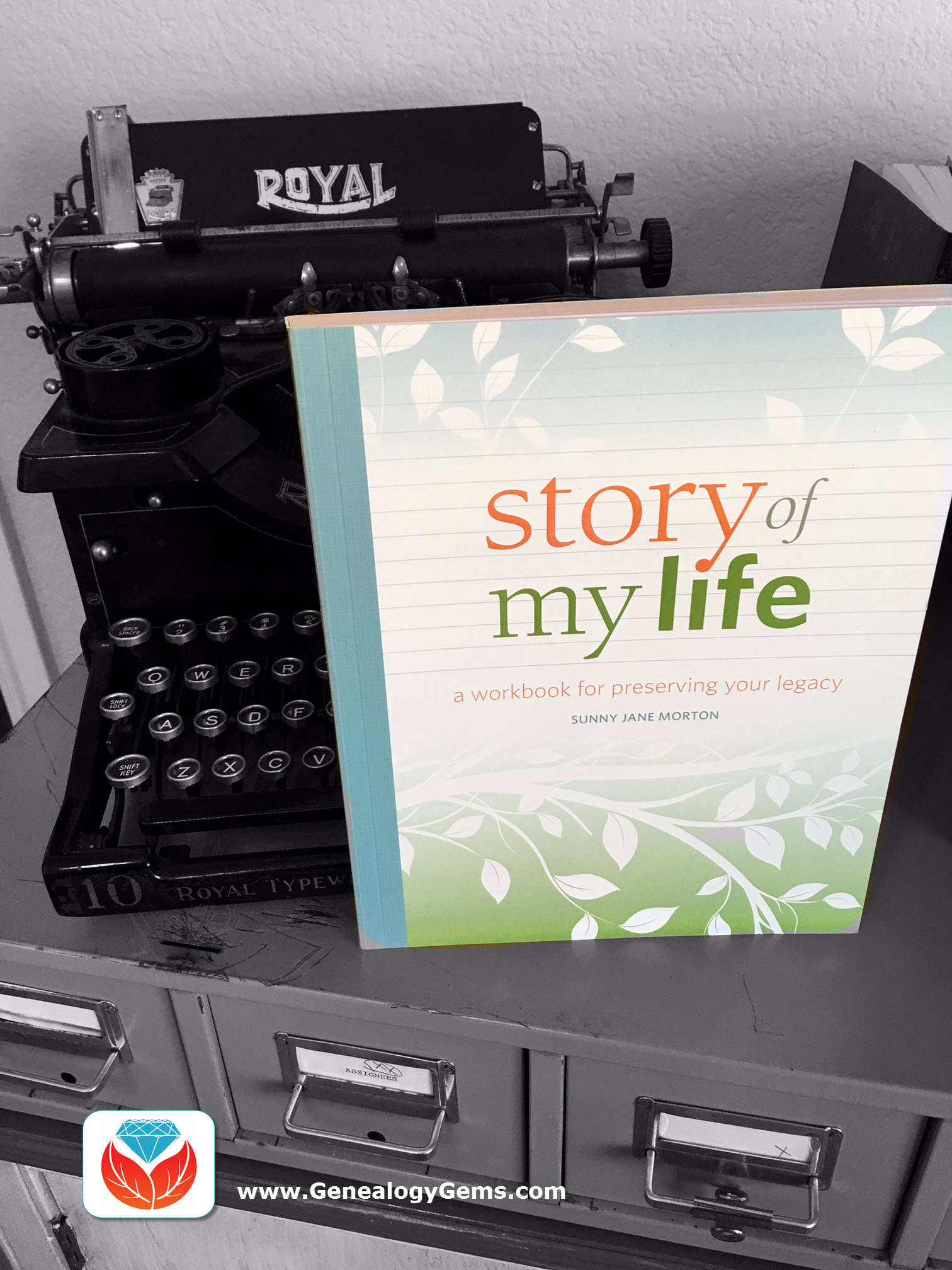
Beginning Your Personal History Journey
Writing a personal history is a big project and one that many of us consider overwhelming. As time rolls on, I know I feel a tugging on the old heart strings to write more of my own history for posterity. I just don’t know how or where to start.
Sunny has the answer in her recent workbook titled Story of My Life. It’s not only a fill-in-the-blank workbook, but inspiring and instructional for any novice or experienced writer. Sunny has also included many tips and hints for how to jog your memory or the memory of others. Others? Yep–others. I love the way she has incorporated ideas in which we can include the memories of others in our personal memoir.
Why This Book is Unique
When asked why her book is different, Sunny shares:
“This book helps you say more than, ‘I remember.’ It helps you say, ‘This is what I got out of my life.’ That’s the ‘so what’ factor that gives your best stories value and staying power. Story of My Life works for every life path and life style, too: its questions cover the gamut from childhood to retirement, motherhood to military life, school to hard-scrabble working, triumphs and failures, and relationships of all kinds.
Along with traditional questions like when and where you were born, Sunny includes places for you to record other special memories. Some special memory ideas include writing about an influential teacher or coach, a godparent, or a flashbulb memory. A flashbulb memory is described as “your memory of a highly public event.” Just reading that reminded me of where I was standing, in an Army base hospital, when I saw the Twin Towers fall on 9/11. It was an event that is burned in my memory and had a lasting effect on me.
More Ideas for Projects and Preservation
Like I said before, Sunny suggests collaborating with others to recall memories of your life from a different perspective. I thought it would be neat to work with my sisters on the “Me and My Mother” worksheets for childhood, adolescence, and adulthood. These help us each reflect on our relationships with her during different seasons of life. I thought it would be neat to collect these worksheets from each of my siblings and have them bound together to give to Mom on Mother’s Day.
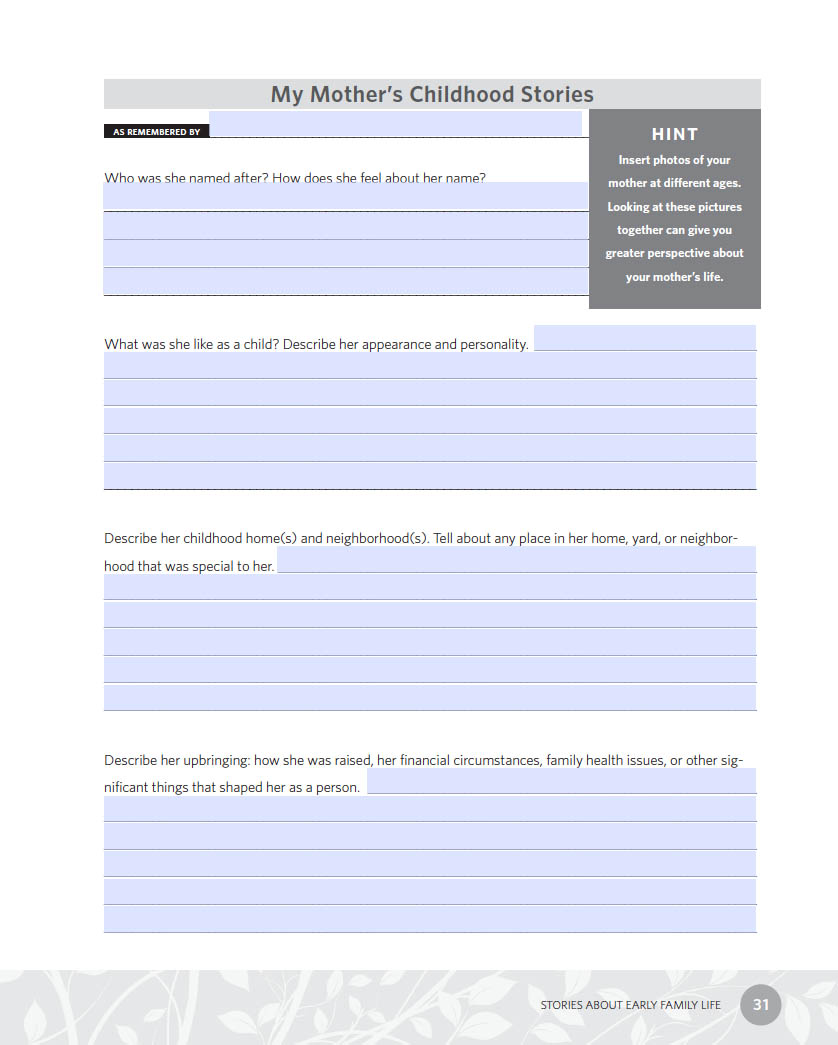
Other ideas include tips for preserving your precious artifacts and memorabilia.
Writing Personal History at any Time in Life
Whether you are just starting out in your adult life or if you are in the prime of retirement, you will finally be motivated and able to complete your personal history. Everyone can use a little motivation and encouragement to write those stories. Follow along as Sunny shows you how to weave your way through the good, the bad, the triumphant, and the sometimes tragic, story of you.
Click here to order your copy of Story of My Life today!
More Gems on Writing Personal History
Disclosure: This article contains affiliate links and Genealogy Gems will be compensated if you make a purchase after clicking on these links (at no additional cost to you). Thank you for supporting Genealogy Gems!
by Lisa Cooke | May 28, 2016 | 01 What's New, Publishing, Social Media, Writing Family History
Want to record your personal history but never seem to have the time? Turn Facebook posts into a book with this nifty service. It’s journaling for the twenty-first 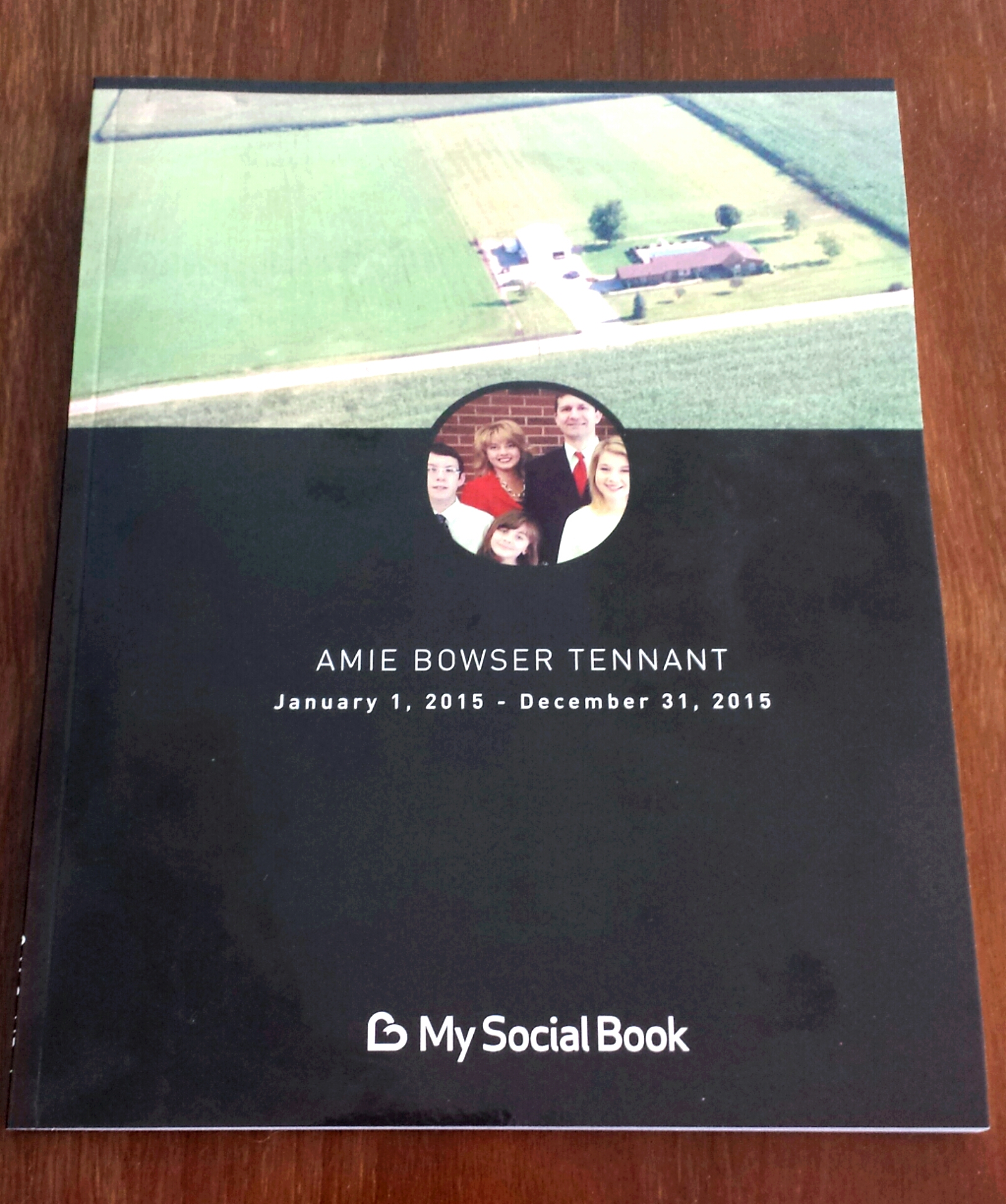 century!
century!
As a teenager, I was an avid journal writer. Now, it’s just one more thing I feel guilty about not doing regularly. But I have recently found an easy and effective solution: My Social Book.
Many of us already use Facebook to share the kinds of events we want to record, such as a grandchild’s kindergarten graduation, a weekend getaway, or a dinner out with friends. My Social Book will turn your Facebook posts into a book–complete with pictures and comments from your friends and family.
My Social Book.com slurps your Facebook statuses, comments, and photos and prints them as a lovely keepsake journal. In this context, slurping refers to an app or website “sucking” your content onto a new site with your permission. It is a wonderful tool.
Here’s How to Turn Facebook Posts into a Book
First, go to My Social Book.com and click “Start your book now.” Next, you will be able to edit your content by date and by posts. (If you want to leave out that silly post you made about your recent ailment, you can do that!)
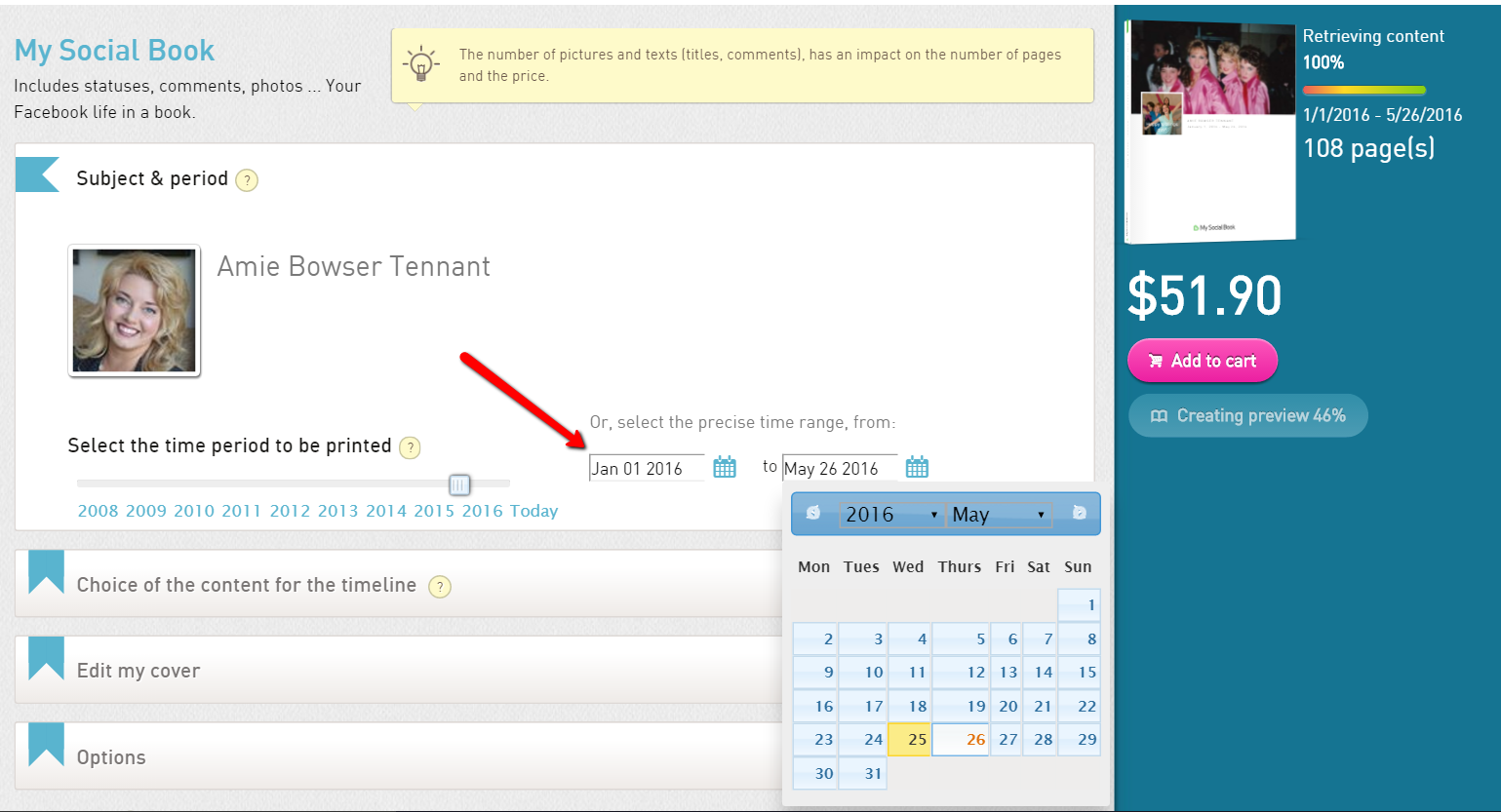
Choose from 16 different book cover colors and choose a soft or hard cover. When you are done, click “See inside” for a look at several of the personalized pages in your book. The final cost depends on the number of pages you included and your cover choice. My soft cover book with 108 pages cost $51.90. There is a small shipping and handling fee. (Tip: Google MySocialBook Coupon for free shipping and discounted prices on your first purchase.)
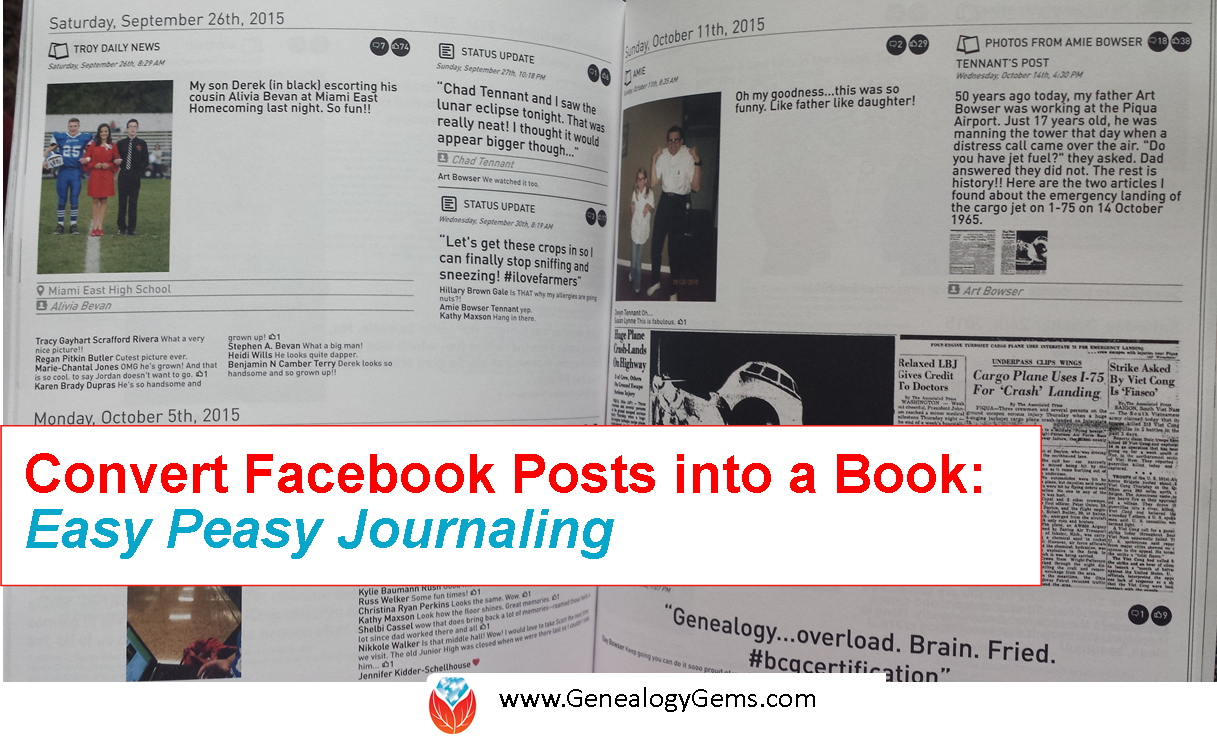 I was delighted with the book I ordered. I plan on ordering one each year. It was fun to read back over the year, see the pictures, and read the comments of my friends and loved ones. I think it will make a wonderful reading addition to the coffee table!
I was delighted with the book I ordered. I plan on ordering one each year. It was fun to read back over the year, see the pictures, and read the comments of my friends and loved ones. I think it will make a wonderful reading addition to the coffee table!
As a little side note, a friend of my mine passed away last year. I had forgotten how often she posted comments on my Facebook posts. It was a nice little reminder of her and I thought how neat it is to have the comments of our loved ones recorded in this way.
Don’t let another year go by without capturing your own personal history back from Facebook! My Social Book is a great answer to making time to keep a journal again.
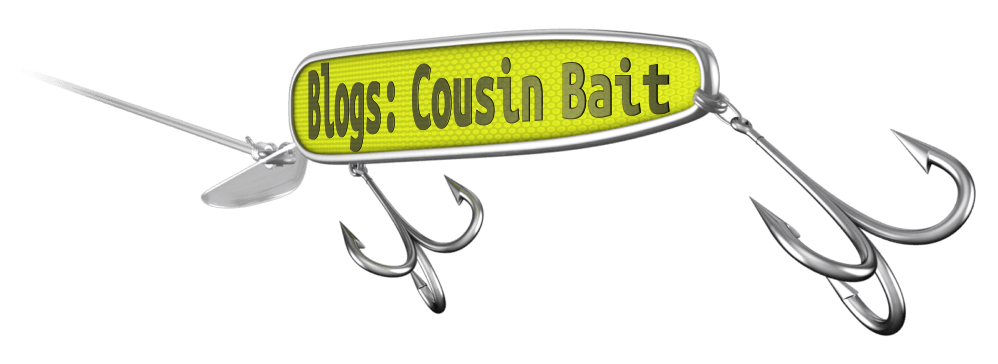 More Gems on Writing Family History
More Gems on Writing Family History
WHY and HOW to Start a Family History Blog
Easy Project to Write Your Family History
Famicity: A New Way to Gather and Share Family Stories
by Lisa Cooke | Jul 25, 2015 | 01 What's New, Beginner, Heritage Scrapbooking, images, Memory Lane, Oral History, Photographs, Writing Family History
Most of us don’t recall our early years well. How can we tell our life’s story if we don’t remember the first chapter?
I’ve learned to use whatever scraps the past gives me. That’s what I did in a scrapbook I put together a few years ago that reconstructs my early childhood. I realized when looking through this album that I actually cobbled together the past from four different sources, only one of which was my own memory:
 1. The family slide collection. I grew up in the 1970s, when slide photography was all the rage (at least with my dad). Several years ago, I scanned all the slides. My digital copies of the slides became the main narrative for the album.
1. The family slide collection. I grew up in the 1970s, when slide photography was all the rage (at least with my dad). Several years ago, I scanned all the slides. My digital copies of the slides became the main narrative for the album.
2. My parents’ memories, captured in an oral history interview. One day, I got both my parents on the phone at the same time. I asked them to look through their CD of the family slides as I looked through my copy. As we looked at each picture–even the not-so-great ones–I asked what memories surfaced. Different things came to mind for each of them, which was fantastic. They captioned the photos for me, filling in the stories behind the pictures.
 3. My baby book. My parents already had my 11-month old brother by the time I came along. So Mom didn’t have a lot of time to write much down. But there are a few gems in my baby book: my mom’s memories and memorabilia from when I was born. These filled in more gaps in my childhood story.
3. My baby book. My parents already had my 11-month old brother by the time I came along. So Mom didn’t have a lot of time to write much down. But there are a few gems in my baby book: my mom’s memories and memorabilia from when I was born. These filled in more gaps in my childhood story.
 4. My own vague childhood memories. All these pictures and memories jogged loose fragments of my own memories. They are still fragmented; some don’t make much sense or tell a whole story. But taken together with everything else, they help reconstruct my childhood enough that I have a much better sense of it now.
4. My own vague childhood memories. All these pictures and memories jogged loose fragments of my own memories. They are still fragmented; some don’t make much sense or tell a whole story. But taken together with everything else, they help reconstruct my childhood enough that I have a much better sense of it now.
The family historian in me made sure I identified the source of each story in the album. My parents’ memories are tagged as such, as are excerpts from my baby book. I typed up my own memories and put them in my own voice.
Who is living who knows something about your childhood? Parents? Step-parents? Grandparents? Aunts or uncles? Friends of the family? What family artifacts or albums may be in the attic, basement or on a shelf? Ask them to help give you back your own past!
Resources:
Family History for Kids Starts WITH the Kids
 Our free Family History Made Easy podcast offers great episodes on topics related to this post: Lisa covers finding family history at home; interviewing skills, and how to contact long-lost relatives (episodes 13 and 14).
Our free Family History Made Easy podcast offers great episodes on topics related to this post: Lisa covers finding family history at home; interviewing skills, and how to contact long-lost relatives (episodes 13 and 14).
Genealogy Gems Premium members can listen to Premium podcast episode 116, which has an interview with Laura Hedgecock, author of Memories of Me: A Complete Guide to Telling and Sharing the Stories of Your Life. (Click here to learn more about Premium membership.)




 Leave a comment below to share your own “genealogy origins” story. Or, if you’re ready to capture more of your life stories, consider purchasing the life-story writing guide, Story of My Life: A Workbook for Preserving Your Legacy by Genealogy Gems Contributing Editor Sunny Morton. It’s packed with journaling prompts for every phase of life–from childhood to retirement–and opportunities to reflect on the relationships and experiences that have shaped you. Give future generations the gift of your life’s stories and lessons: the pearls you have to pass on.
Leave a comment below to share your own “genealogy origins” story. Or, if you’re ready to capture more of your life stories, consider purchasing the life-story writing guide, Story of My Life: A Workbook for Preserving Your Legacy by Genealogy Gems Contributing Editor Sunny Morton. It’s packed with journaling prompts for every phase of life–from childhood to retirement–and opportunities to reflect on the relationships and experiences that have shaped you. Give future generations the gift of your life’s stories and lessons: the pearls you have to pass on.





 century!
century!
 I was delighted with the book I ordered. I plan on ordering one each year. It was fun to read back over the year, see the pictures, and read the comments of my friends and loved ones. I think it will make a wonderful reading addition to the coffee table!
I was delighted with the book I ordered. I plan on ordering one each year. It was fun to read back over the year, see the pictures, and read the comments of my friends and loved ones. I think it will make a wonderful reading addition to the coffee table! More Gems on Writing Family History
More Gems on Writing Family History






